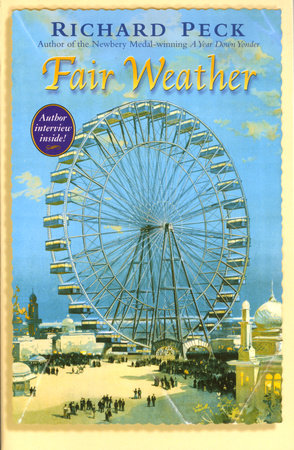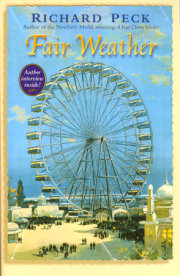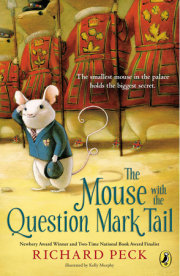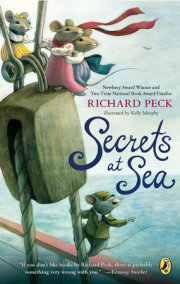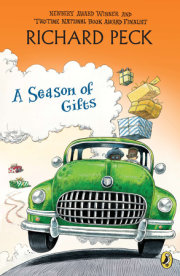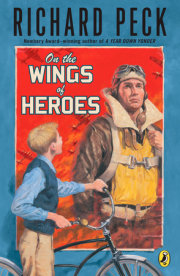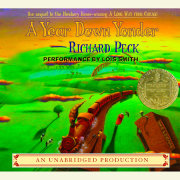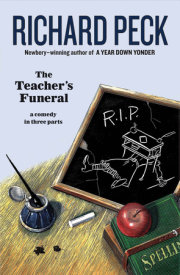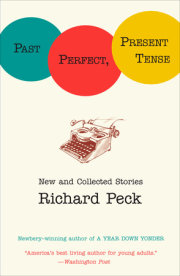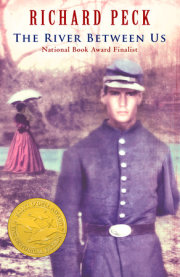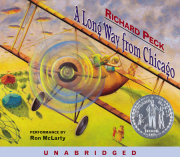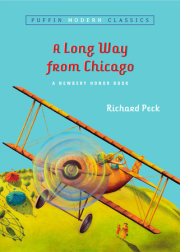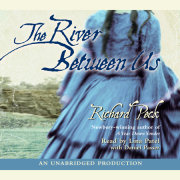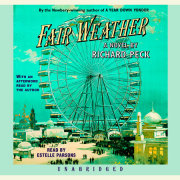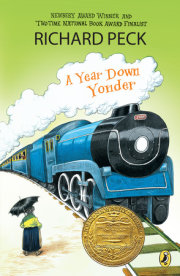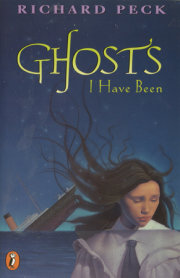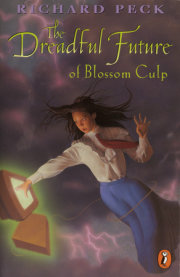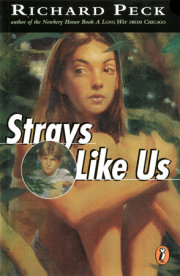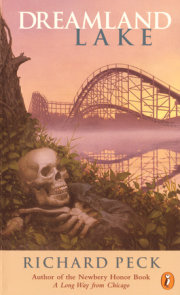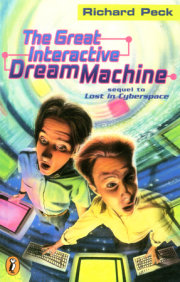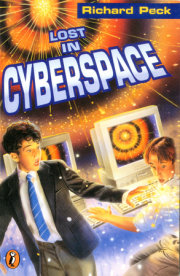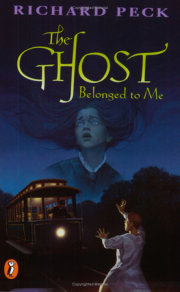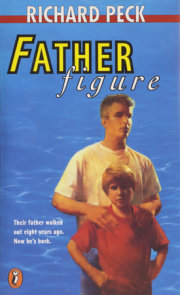Bright Lights and Bad Women Evening shadows found us clustered at the dining-room table. Aunt Euterpe's huge, unexplored house hulked over us. She hadn't brought electrical wire into it because, as she said, she didn't understand how electricity worked. Blue flame flickered from the gasolier above our heads, making us all look long dead.
We hadn't changed our clothes, as we were already wearing our best. In his ice-cream suit Granddad glowed. Aunt Euterpe had unveiled herself for dinner and drooped at her place like a waxen lily. Timidly she tinkled a tarnished bell beside her plate.
The door fanned open, and in came a woman backward, bearing plates of soup-a big, husky woman in a cook's cap. She looked like she might butcher cattle on her day off. Behind her with more plates was the maid who'd let us in. What a lot of people it took to keep Aunt Euterpe going.
When the big cook skidded the soup plates under our noses, Granddad stared down through his specs. It was a mighty thin soup. You could see the roses on the bottom of the plate. Greasy too, with things floating in it. I was reminded of the Chicago River.
Granddad was not a swearing man, not in front of women and children. But Mama allowed him two oaths in the house. One was hecka-tee. The other was helaca-toot.
"Helaca-toot, Terpie!" he cried out. "What kind of excuse for soup is this? It looks like somethin' drained out of the umbrella stand."
The little maid shied. The big cook glared at Granddad and barged back to the kitchen."Oh, Papa," Aunt Euterpe whispered.
Though he'd only sampled the soup, Granddad wrung out his moustache and waited for the next course. We all dreaded it, and with good reason. It was boiled mutton and two tough cabbage leaves. Peeping out from under the cabbage were the many eyes of a gray potato. Aunt Euterpe took up her fork in a hopeful way, but Granddad flung back in his chair.
"I'd sooner eat a pan-fried overshoe!" He folded his arms in that stubborn way he had. So did Buster. It was a worry to us how Buster learned his manners from Granddad.
The cook had been listening behind the door. Now she was back, looming over Aunt Euterpe. "Lissen, Miz Fleischacker," she thundered. "I ain't used to having my cookery bad-mouthed, especially by some old hayseed of a-"
"Yes, Mrs. O'Shay," Aunt Euterpe murmured. "It is only a misunderstanding."
The little maid peering around the door vanished when Mrs. O'Shay banged through it.
Lottie shot me a look, and I read it plain. Aunt Euterpe was afraid of her hired help.
Dessert was stewed prunes, and that did it for Granddad. He threw his napkin and pushed back his chair. "I have an idee they're eatin' better than this over at the fairgrounds."
"Papa! You can't think of going to the fair tonight." Aunt Euterpe spoke from behind a napkin pressed to her lips.
"Why not? They'd have the lights on."
"I can't ask Flanagan to bring the carriage around again." Aunt Euterpe quivered. "He wouldn't like it."
When Granddad's dander was up, his chin looked like a clenched fist. "Then how do the common people get to the fair?"
Aunt Euterpe swayed in her chair. "The Illinois Central runs cars down to the gate. But, Papa, it's getting late. You couldn't possibly take these children. Awful, rough types come out after dark. And bad…women."
Bright lights and bad women were no discouragement to Granddad. We were on our way to the fair before we knew. And Aunt Euterpe too, for fear we children would all be murdered and Mama would hold it against her.
We took our second trip by train in a single day. The Illinois Central blazed like a meteor across Chicago, flashing past the lighted windows of people who never looked up. And crowded? It was a regular cattle car. We had to stand up, cheek-by-jowl with perfect strangers, though people stepped aside from Aunt Euterpe's many black veils. Others drew back for a look at Granddad in his finery. But did any man get up to give Aunt Euterpe his seat? Not in Chicago he didn't.
We clung to leather nooses that hung from the ceiling of the car. Lottie and I kept Buster between us. We were worn to a frazzle before we were halfway there. But then we pulled into the cavern of another vast station, this one built expressly for the fair. A human tidal wave swept us through the turnstiles. Ahead of us looked like daybreak. The whole sky was on fire.
Onward we went, and how can I explain how it was to us? There was no night. White electricity had lit the world and erased the stars. Now we were standing beside a long body of water, busy with drifting gondolas. On both sides of the pond stood the great pavilions of the Columbian Exposition, the White City. It was Greece and Rome again, and every column and curlicue lit by an incandescent bulb.
On either side of us plumes of water danced in every hollyhock color. There in the square lake ahead a stone replica of a ship pretended to float. It may have been like the one Christopher Columbus sailed into the New World, sent on his way by Spanish royalty.
We couldn't take it in. We couldn't breathe. Granddad whispered, "Hecka-tee, Edison. What have you done?"
"This is the Court of Honor," Aunt Euterpe said. It shimmered all the way to a pier out into Lake Michigan. "It is one corner of the fair."
"There's more?" There couldn't be.
"Six hundred acres." She pointed out the great Halls of Machinery and Agriculture and Mines, the Hall of Music and the Casino, all of them doubled by the reflecting pool. From the roof of the Hall of Electricity the Westinghouse alternating-current searchlight swept the scene in a terrifying way.
Lottie had my hand in a grip of steel. We hadn't bargained on anything like this. We were scared, of course, but I longed to be a poet, to pin this vision to a page. It had a beauty beyond your wildest dreams, and so big, it made us mice.
It was too much world for me all at once, and I heard Lottie thinking the same. The music of a full brass band playing "The Columbian March" wavered over the summer-thunder sound of all this multitude of people. My eyes stung.
"Granddad," Buster said, "I'm hungry."
Dragging Buster, we drifted in this dream among the crowds. Like Venice, the fair was built on canals, arched with marble bridges. We walked forever beside the Manufacturers Hall. There across more water rose the great cut-glass dome of the Horticultural Building. On an island against the fiery night were the strange swooping roofs of the Japanese village. People moved around us in trances like ours, feeling the light on their faces. Ladies in gondolas trailed their hands in the bright water.
"Where can a fella get some grub?" Granddad called out to all in earshot. "I thought Chicago was a German town. Where's the schnitzel?"
Aunt Euterpe quaked.
A man who didn't know Granddad from Adam turned to say, "Well, old sport, they want an arm and a leg for eats here on the grounds. Try the Midway."
Aunt Euterpe lurched. She grabbed at both us girls.
"What's the Midway, Aunt Euterpe?" Lottie asked.
"It is a sinkhole of corruption," she murmured, low and hopeless. "I made a solemn vow to keep you children clear of it. No decent-"
"Is it where the Ferris wheel is?" Buster piped up. He was always right there when you didn't want him to hear.
"Anybody know where the Midway is?" Granddad called out. People began to point the way.
We led Aunt Euterpe, and she wasn't herself. "If only I hadn't written that letter to your mother," she was mumbling. "What a can of worms I have opened."
But Lottie gripped her elbow. "Never mind, Aunt Euterpe. If the Midway isn't for decent people, you won't see anybody you know." It looked like Lottie was taking charge. "And throw back your veils, Aunty," she said, "or you'll miss your footing on all these marble steps." Lottie was firm with her.
We found the Midway. We had two fine bridges to cross. Then past the great dome of the Illinois Building and behind the Woman's Building, the White City stopped. We left the exposition and ganged with the thickening crowds under the Illinois Central tracks. Then there it was, bellowing music and blazing in lights of every color. The Midway-the Midway Plaisance, to give its proper name.
We'd left the white marble and fine statues behind us. This was another world. Here was Hagenback's Animal Show featuring bears on bicycles. Here was the Blarney Castle in an Irish village pounding with clog dancers. The Persians were here, and the Javanese and the Congress of International Beauties. Music came from every direction until I thought my ears would drown. There were calliopes and tambourines and the beat of the cannibal drum. Up on a stage at an upright piano a young man named Scott Joplin banged out tunes you could hear with your feet.
On both sides of the Midway the world had come to strut its stuff: an ostrich farm and the Turkish Village and the Panorama of the Bernese Alps. There was an ice rink here in the depth of summer, and everything lit up like a Christmas tree.
The sweetness of taffy pulled on giant machines hung in the air. Corn on the cob boiled in giant vats. Sausage was being fried with onions, though you could tell from here the lard wasn't fresh.
Granddad parted the common people with his stick, and we clung like leeches to him. One false step, and the crowds would swallow you like Jonah's whale.
Then I looked up and staggered back. Ahead of us in the center of the Midway was the fright of my life. It was the giant wheel. We were walking straight toward it. You couldn't see to the top of the thing. It rose into the night. The creak of its struts and girders sounded in mydreams for years.
Granddad himself drew up and threw back his head. People rode the wheel in thirty-six cars. While they weren't quite as big as railroad cars, they'd hold sixty people each. To see them moving up there in the night air was beyond anything.
"They say the axle on that thing is forty-five foot across," Granddad explained. "The largest single hunk of steel ever forged." But he spoke in a hushed and strangely respectful voice.
"We ain't a-going to ride it tonight, are we?" Buster asked. Whenever he was scared, his grammar got worse.
"I thought you was hungry," said Granddad to spare him.
In front of a place called Old Vienna people ate out in the open. A waiter was settling us around a table when Aunt Euterpe leapt up like she'd sat on an anthill. "Girls, don't look!" she shrieked, reaching for our eyes.
My land, I thought. Did somebody fall off the Ferris wheel? Naturally, we looked. Just across the Midway was a vast cardboard place with minarets. It was called A Street in Cairo. A big sign offered camel rides, if you can imagine wanting to do that. It was a popular spot. Throngs were going inside.
"Papa!" Aunt Euterpe said. "We can't stay here. We must leave at once."
Granddad hunkered down in his chair. "I don't budge till I bin fed and watered." But now he too was looking over at A Street in Cairo. "Is this where that girl called Little Egypt does her dance?" he inquired.
Aunt Euterpe crumpled. A musical clatter of bells wafted across the Midway. Four women wearing veils far thinner than Aunt Euterpe's-and very little else-capered on a stage and did a dance like you never saw. They flung their hips to the four winds, and there were bells on their toes.
Aunt Euterpe was near tears, and Granddad was all eyes. "Hecka-tee," he whispered.
We had us a good supper at the Old Vienna, though Granddad warned us not to order the bratwurst."Chicago's a meat-packin' town," he explained, "and once in a while a workin' man will fall into the grinder and come out as links of prime smoked sausage."
Lottie swallowed hard.
But we made a hearty meal out of sauerbraten, sour potato salad, and vinegared cucumbers. Over our heads the terrible wheel creaked. Across the Midway dancing girls writhed like serpents. It liked to kill Aunt Euterpe, but Lottie told her, "Aunty, they're doing Salome's dance of the seven veils. It's from the Bible. Eat your supper."
In time Aunt Euterpe licked her platter clean like she couldn't remember her last square meal. Maybe she couldn't. We all ate like thrashers, Granddad missing his mouth several times from watching the dancers.
They didn't let Little Egypt out on the stage. To see her dance, you had to pay and go inside. They charged you every time you turned around at the fair. They just about charged you to breathe.We hadn't eaten this late in our lives, and we were full to the gills when we left Old Vienna. The Midway was seven eighths of a mile long, and we'd only traversed half of it. The crowds swept us along by a big pink-lit structure called The Columbian Theater.
Buster bounced and pointed up. "Granddad! You brought Lillian!"
To our wondering eyes a big sign over the theater spelled out inelectric bulbs: PRESENTING THE TOAST OF AMERICA LILLIAN RUSSELL
I didn't know what to think. It wasn't beyond Granddad to bring his horse to Chicago. He'd brought Tip. But nobody would call Granddad's old gray mare the toast of America. Aunt Euterpe snatched at Lottie and me.
Granddad stared open-mouthed up at the sign. Over the din of the crowd I could swear I heard him whisper, "My prayers is answered."
We got it sorted out. Lillian Russell-the real one-was a woman, an actress. Admiring her, Granddad had named his horse for her. It was the kind of thing he'd do.
"Papa!" Aunt Euterpe barked. "Don't think of taking these children to see that woman!" Aunt Euterpe's patience hung by a thread.
Granddad rounded on her. "Would it mark 'em for life to see the prettiest gal and the sweetest singer in the United States?"
"She paints her face!" Aunt Euterpe shot back.
"So does Buffalo Bill," Granddad answered. "Girl, they're in show business."
"Papa, she was barred from the Washington Park clubhouse by the best ladies in Chicago society!"
"They's hypocrites," Granddad spat.
"She's a fallen woman." Aunt Euterpe stumbled over her words.
"Horsefeathers," Granddad replied. "She's from Clinton, Iowa. And she can hit high C eight times in the same song."
"Papa," Aunt Euterpe reasoned hopelessly, "that woman has been married three times."
"She could marry four times if she'd have me!" The crowds around us stared at Granddad, and Lottie went beet red. "I'm goin' in to see the show," he said.
"Papa, I am taking these children home." Aunt Euterpe's patience had snapped.
"Take 'em," Granddad said, walking away already, following the crowds into The Columbian Theater.
Confused, Buster called after him, "Granddad, did you bring Lillian or not?"
Copyright © 2001 by Richard Peck. All rights reserved. No part of this excerpt may be reproduced or reprinted without permission in writing from the publisher.

